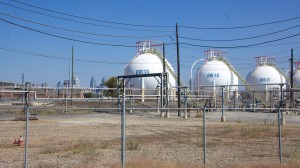EPA: new emissions rules for refineries would protect neighboring communities
-
Katie Colaneri

Nat Hamilton/WHYY
Philadelphia Energy Solutions is the largest oil refining complex on the Eastern seaboard.
The Environmental Protection Agency is proposing new emissions rules for refineries aimed at protecting neighborhoods nearby from toxic pollutants, the department announced today.
Refineries would be required to measure concentrations of benzene at the fence lines that separate the industrial facilities from the surrounding communities and to make the data publicly available. According to the EPA, chronic inhalation of benzene can cause serious health problems, including blood disorders and certain cancers. The EPA would also require refineries to upgrade pollution controls for storage tanks and create standards for flaring off excess gases.
“The common-sense steps we are proposing will protect the health of families who live near refineries and will provide them with important information about the quality of the air they breathe,” said EPA Administrator Gina McCarthy in a statement.
The agency claims emissions, including benzene, toluene, and xylene, would be reduced by about 5,600 tons per year.
Joseph Minott, Executive Director of the Philadelphia-based Clean Air Council, praised the measure as a “game changer” for residents who live near the Philadelphia Energy Solutions refinery complex in South Philadelphia.
“If I was hosting a very large polluting facility, that would empower me,” said Minott. “I’d know how much better what I was exposed to and whether plant was complying with its permits.”
The American Petroleum Institute, a major industry trade group that counts the former Sunoco refinery as a member, criticized the proposed rules as being economically cumbersome without environmental benefit.
“America’s refineries have been reducing emissions for decades and will continue reducing emissions under existing regulations while making the cleanest fuels and helping to improve air quality,” said Howard Feldman, Director of Regulatory and Scientific Affairs, in a statement.
The EPA is planning two public hearings near Los Angeles and Houston and plans to finalize the rules by April 2015. The Clean Air Council is requesting the EPA hold a hearing in Philadelphia.
















